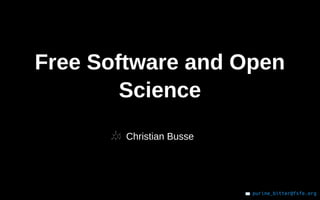SFSCON23 - Christian Busse - Free Software and Open Science
The Open Science movement aims to increase the transparency, reproducibility and inclusiveness of academic research. One of its central goals is therefore to make research outputs broadly available, e.g., manuscripts (Open Access) or research data (Open Data). While software/code created in the course of scientific research is a key artifact of scientific research that is clear distinct from the latter two, it has until recently not received the same attention as manuscripts or data, although it follows its own set of paradigms. In this talk I will present an overview on how the core concepts of Free Software and the FAIR (findable, accessible, interoperable, reuseable) Principles intersect, what this means for managing code as research output and recent initiatives on the European level that will provide support for these issues.

Recommended
Recommended
More Related Content
Similar to SFSCON23 - Christian Busse - Free Software and Open Science
Similar to SFSCON23 - Christian Busse - Free Software and Open Science (20)
More from South Tyrol Free Software Conference
More from South Tyrol Free Software Conference (20)
Recently uploaded
Recently uploaded (20)
SFSCON23 - Christian Busse - Free Software and Open Science
- 1. Free Software and Open Science Christian Busse purine_bitter@fsfe.org ✉
- 2. Definitions (2019) ● Free Software: Software released under an FSF and/or OSI compliant license, ensuring the four freedoms to Use, Study, Share and Improve. ● Open Science: “Hmm… maybe this thing with the free journal articles? Or sharing of research data?”
- 3. Definitions (2023) Open Science[1] : “practices aiming to make multilingual scientific knowledge openly available, accessible and reusable for every- one, to increase scientific collaborations and sharing of information for the benefits of science and society, and to open the processes of scientific knowledge creation, evaluation and communication to societal actors beyond the traditional scientific community.” [1] UNESCO Recommendation on Open Science (2021) DOI:10.54677/MNMH8546
- 4. Pillars of Open Science According to the UNESCO Recommedation[1] , Open Science builds on: ● open scientific knowledge ● open science infrastructures ● science communication ● open engagement of societal actors ● open dialogue with other knowledge systems [1] UNESCO Recommendation on Open Science (2021) DOI:10.54677/MNMH8546
- 5. Open scientific knowledge “Open scientific knowledge refers to open access to ● scientific publications, ● research data, metadata, ● open educational resources, ● software and source code and ● hardware that are available in the public domain or under copyright and licensed under an open licence that allows access, re-use, repurpose, adaptation and distribution [...] free of charge”[1] [1] UNESCO Recommendation on Open Science (2021) DOI:10.54677/MNMH8546
- 6. Open source software - according to UNESCO[1] “Open source software [is] software whose source code is made publicly available [...] under an open license that grants others the right to use, access, modify, expand, study, create derivative works and share the software and its source code, design or blueprint. […] [W]hen open source code is a component of a research process, enabling reuse and replication generally requires that it be accompanied with open data and open specifications of the environment required to compile and run it.”[1] [1] UNESCO Recommendation on Open Science (2021) DOI:10.54677/MNMH8546
- 7. Summary (I) ● The UNESCO Recommendation[1] defines software as an first-class output of the scientific process, on a par with data and scholarly communication ● The Recommendation’s requirements for “open source software” match established FOSS definitions quite closely ● Additional requirements address reproducibility and unit tests [1] UNESCO Recommendation on Open Science (2021) DOI:10.54677/MNMH8546
- 8. The FAIR Principles[1] ● Published in 2016[2] , the principles recommend that research data should be published in a way that it is ● Findable (indexed, rich metadata, persistent identifier) ● Accessible (resolv. identifier, open protocol, permanent metadata) ● Interoperable (formal, shared & broadly applicable language, FAIR vocabularies) ● Reuseable (community standards, provenance, licensing) ● Data should not only be FAIR for humans but also for machines ● Principles apply to data as well as to their metadata (where applicable) [1] https://www.go-fair.org/fair-principles/ [2] Wilkinson et al. (2016) DOI:10.1038/sdata.2016.18
- 9. ● FAIR was originally defined for data[1] , not for code[2] ● FOSS is not necessarily FAIR ● FAIR software is not necessarily FOSS ● A digital object cannot be FAIR by itself, it (typically) requires a repository [1] DOI: 10.1038/sdata.2016.18 [2] DOI: 10.3233/DS-190026 FAIR and FOSS are complementary paradigms
- 10. Summary (II) ● The policy side is more or less resolved by now, we now need to work on community-controlled, publicly funded infrastructure ● Software repositories need to provide support for a FAIR ecosystem ● Publishing software via repository needs to reinforced via the academic incentive schemes
- 11. Thank you for your attention! Questions?
